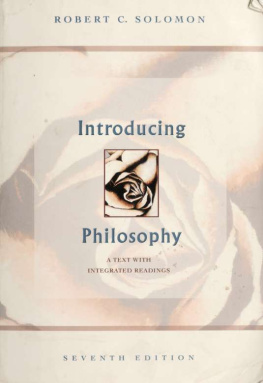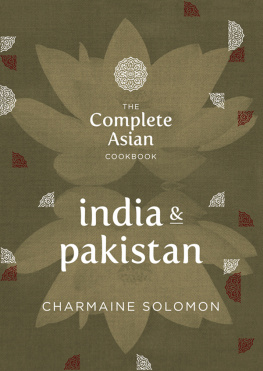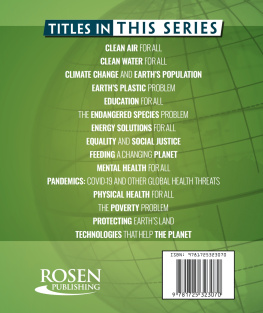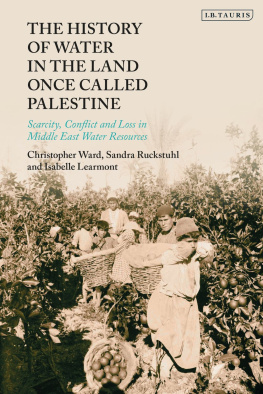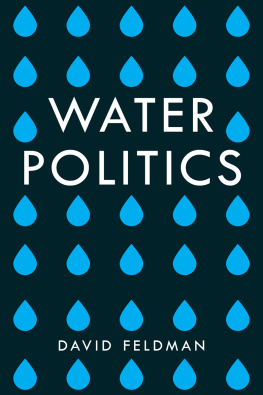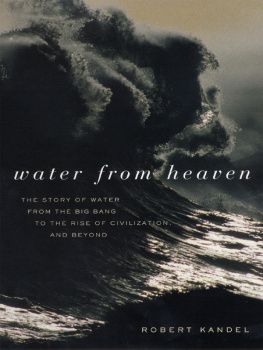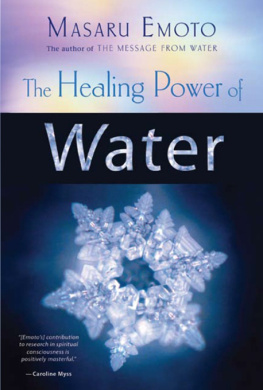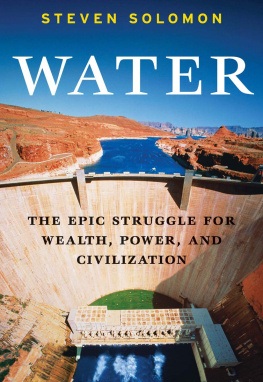Solomon - Water: The Epic Struggle for Wealth, Power, and Civilization
Here you can read online Solomon - Water: The Epic Struggle for Wealth, Power, and Civilization full text of the book (entire story) in english for free. Download pdf and epub, get meaning, cover and reviews about this ebook. City: Toronto, year: 2010;2011, publisher: HarperCollins;Cnib, genre: History. Description of the work, (preface) as well as reviews are available. Best literature library LitArk.com created for fans of good reading and offers a wide selection of genres:
Romance novel
Science fiction
Adventure
Detective
Science
History
Home and family
Prose
Art
Politics
Computer
Non-fiction
Religion
Business
Children
Humor
Choose a favorite category and find really read worthwhile books. Enjoy immersion in the world of imagination, feel the emotions of the characters or learn something new for yourself, make an fascinating discovery.
Water: The Epic Struggle for Wealth, Power, and Civilization: summary, description and annotation
We offer to read an annotation, description, summary or preface (depends on what the author of the book "Water: The Epic Struggle for Wealth, Power, and Civilization" wrote himself). If you haven't found the necessary information about the book — write in the comments, we will try to find it.
Water: The Epic Struggle for Wealth, Power, and Civilization — read online for free the complete book (whole text) full work
Below is the text of the book, divided by pages. System saving the place of the last page read, allows you to conveniently read the book "Water: The Epic Struggle for Wealth, Power, and Civilization" online for free, without having to search again every time where you left off. Put a bookmark, and you can go to the page where you finished reading at any time.
Font size:
Interval:
Bookmark:
For Claudine Mace
Water mingles with every kind of natural phenomenon; and more than one might imagine, it has also mingled with the particular destiny of mankind.
Fernand Braudel, Memory and the Mediterranean
When the well is dry, we learn the worth of water.
Benjamin Franklin, Poor Richards Almanac
I n 1763 a twenty-seven-year-old instrument maker named James Watt repaired a model of a Newcomen steam engine owned by the University of Glasgow. Britain was in the grip of a dire fuel famine resulting from the early deforestation of its countryside, and many of the primitive engines invented by Thomas Newcomen a half century earlier were working to pump floodwater from coal mines so that more coal could be excavated as a substitute fuel. While repairing the Newcomen machine, Watt had been startled by its inefficiency. Filled with the spirit of scientific inquiry then going on in the Scottish Enlightenment, he determined to try to improve its capacity to harness steam energy. Within two years he had a much-more-efficient design, and by 1776 was selling the worlds first modern steam engine.
James Watts improved steam engine was a turning point in history. It became the seminal invention of the Industrial Revolution. Within a matter of decades, it helped transform Britain into the worlds dominant economy with a steam-and-iron navy that lorded over a colonial empire spanning a quarter of the globe. Britains pioneering textile factories multiplied their productivity and output by shifting from waterwheel to steam power and relocating from rural riversides to new industrial towns. Steam-driven bellows heated coke furnaces to produce prodigious amounts of cast iron, the plastic of the early industrial age. Watt steam engines helped overcome Britains fuel famine by pumping excess water out of coal shaftsand put the discharge to use by supplementing the water supply of the inland canals that had sprung up to expedite the growing shipments of coal from the collieries to the markets. Watt steam engines abetted the rise of urban metropolises, and improved the health and longevity of their residents, by pumping up freshwater from rivers for drinking, cooking, sanitation, and even firefighting. From Watts steam engine, a new industrial society took hold that launched human civilization on an altogether new trajectory. World and domestic balances of power were recast, and mankinds material existence, population levels, and expectations increased more in just two centuries than they had in all the thousands of preceding years.
Yet as momentous as it was, Watts innovation for exploiting steam power was but one of a long list of water breakthroughs that have been causally entwined with major turning points in historymuch like the one unfolding before us today. Water has strongly influenced the rise and decline of great powers, foreign relations among states, the nature of prevailing political economic systems, and the essential conditions governing ordinary peoples daily lives. The Industrial Revolution was akin to the Agricultural Revolution of about 5,000 years ago, when societies in ancient Egypt, Mesopotamia, the Indus Valley, and northern China separately began mastering the hydraulic arts of controlling water from large rivers for mass-scale irrigation, and in so doing unlocked the economic and political means for advanced civilization to begin. Ancient Rome rose as a powerful state when it gained dominance over the Mediterranean Sea, and developed its flourishing urban civilization at the heart of its empire on the flow of abundant, clean freshwater brought by its stupendous aqueducts. The takeoff event and vital artery of Chinas medieval golden age was the completion of its 1,100-mile-long Grand Canal, which created a transport highway uniting the resources of its wet, rice-growing, southerly Yangtze region with its fertile, semiarid Yellow River northlands. Islamic civilizations brilliance was sustained by the trading wealth that accompanied the opening of its once-impenetrable, waterless deserts by long-distance camel caravans that spanned from the Atlantic to the Indian oceans. Open oceanic sailing was the Wests breakthrough route to world dominance, which it built upon through its leadership in steam, hydraulic turbines, hydroelectricity, and other water technologies of the industrial age. The sanitary and public health revolutions of the late nineteenth and early twentieth centuries that underpinned mankinds unprecedented demographic transformations sprung from efforts to provide freshwater free of filth and conditions inhospitable for disease-carrying organisms. Americas historical rise, too, was explained in important part by its mastery and integration of its three diverse hydrological environments: exploitation of the industrial waterpower and transport potential of the year-round rivers in its temperate, rainy eastern half, highlighted by the catalytic Erie Canal; the naval domination of its two ocean frontiers, and ascendance to world leadership, following the epic building of the Panama Canal; and the triumph over its arid Far West by its pioneering innovation of giant, multipurpose dams inaugurated with its Depression-era Hoover Dam. The worldwide diffusion of giant dams, in turn, was a linchpin of the Green Revolution, and ultimately the emergence of todays global integrated economy.
That control and manipulation of water should be a pivotal axis of power and human achievement throughout history is hardly surprising. Water has always been mans most indispensable natural resource, and one endowed with special, seemingly magical powers of physical transformation derived from its unique molecular properties and extraordinary roles in Earths geological and biological processes. Through the centuries, societies have struggled politically, militarily, and economically to control the worlds water wealth: to erect cities around it, to transport goods upon it, to harness its latent energy in various forms, to utilize it as a vital input of agriculture and industry, and to extract political advantage from it. Today, there is hardly an accessible freshwater resource on the planet that is not being engineered, often monumentally, by man.
Whatever the era, preeminent societies have invariably exploited their water resources in ways that were more productive, and unleashed larger supplies, than slower-adapting ones. Although often overlooked, the advent of cheap, abundant freshwater was one of the great growth drivers of the industrial era: its usage grew more than twice as fast as world population, and its ninefold increase in the twentieth century rivaled the more celebrated thirteenfold growth in energy. By contrast, failure to maintain waterworks infrastructures or to overcome water obstacles and tap the hidden opportunities water always presents has been a telltale indicator of societal decline and stagnation.
Every era has been shaped by its response to the great water challenge of its time. And so it is unfoldingon an epic scaletoday. An impending global crisis of freshwater scarcity is fast emerging as a defining fulcrum of world politics and human civilization. For the first time in history, modern societys unquenchable thirst, industrial technological capabilities, and sheer population growth from 6 to 9 billion is significantly outstripping the sustainable supply of fresh, clean water available from nature using current practices and technologies. Previously, mans impact on ecosystems had been localized and modest. Across heavily populated parts of the planet today, much of the rivers, lakes, and groundwater on which growing societies depend are becoming dangerously depleted by overuse and pollution. As a result, an explosive new political fault line is erupting across the global landscape of the twenty-first century between water Haves and water Have-Nots: internationally among regions and states, but just as significantly within nations among domestic interest groups that have long competed over available water resources. Simply, water is surpassing oil itself as the worlds scarcest critical resource. Just as oil conflicts were central to twentieth-century history, the struggle over freshwater is set to shape a new turning point in the world order and the destiny of civilization.
Font size:
Interval:
Bookmark:
Similar books «Water: The Epic Struggle for Wealth, Power, and Civilization»
Look at similar books to Water: The Epic Struggle for Wealth, Power, and Civilization. We have selected literature similar in name and meaning in the hope of providing readers with more options to find new, interesting, not yet read works.
Discussion, reviews of the book Water: The Epic Struggle for Wealth, Power, and Civilization and just readers' own opinions. Leave your comments, write what you think about the work, its meaning or the main characters. Specify what exactly you liked and what you didn't like, and why you think so.


